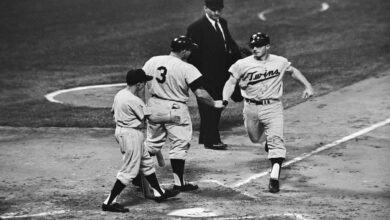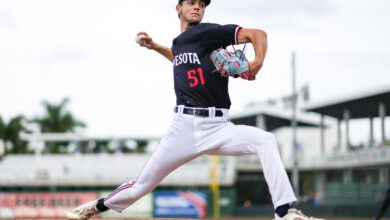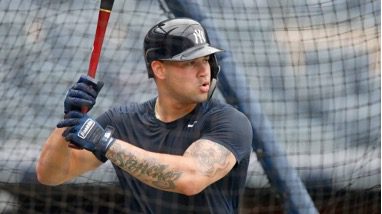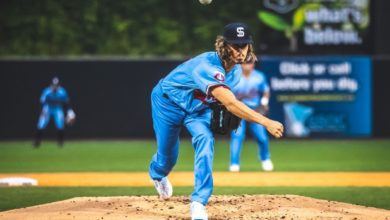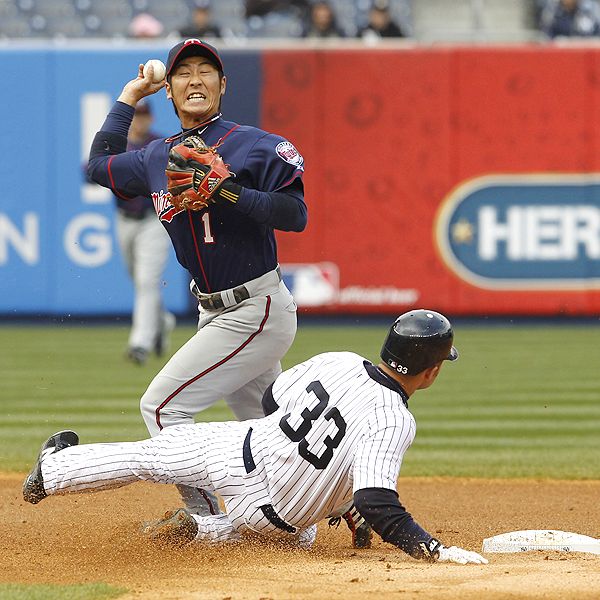
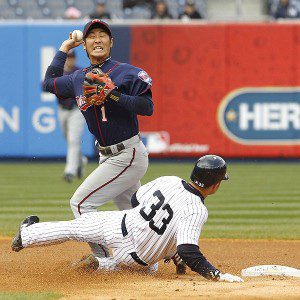
You can place a wager on almost anything in Las Vegas, from the result of a cricket match in England to whether a national anthem performer will flub the lyrics. Recently, the 2012 over/unders for wins in baseball were announced, and for the Twins, that number is 73. Because baseball is a numbers game, I’m going to give you three reasons why you should take the “over” for the Twins. For reference, last season the Twins won only 63 games, so they need to improve by 11 games. Here’s why they will do it:
1. The offense is going to be considerably better than it was last year. Importantly, Denard Span, Jamey Carroll and Joe Mauer will be batting at the top of the order. Span has a career on-base percentage of .361, Carroll stands at .356 and Mauer at .403. If these three players even have average years, the Twins should score many more runs than they did last year, when Span and Mauer were injured for significant portions of the season, and when Tsuyoshi Nishioka started the season bating second in the order, but thereafter broke his leg, demonstrated time and time again that he wasn’t a major-league caliber player and only got on base at a .278 clip. In short, the Twins have installed veteran hitters (Span instead of Ben Revere, Carroll instead of Nishioka and Mauer in favor of Drew Butera) in spots at the top of the order that were previously occupied by replacement-level players. Span, Carroll and Mauer should be excellent table setters. Over the course of 162 games, this will mean that the Twins score many more runs than they did last year.
2. Nishioka will not, in all likelihood, be starting. In 2011, the Twins brought Nishioka over from Japan, where he had just led the Chiba Lotte Marines to a championship, accumulating 206 hits, a .346 batting average and 121 runs scored along the way. He was also a previous Gold Glove award winner at both second base and shortstop. The Twins contracted with Nishioka for three years and $9 million, plus a club option for a fourth year or a $250,000 buyout. It is an understatement to suggest that Nishioka has disappointed. Of the five tools used to measure a baseball player (hitting for average, hitting for power, base running skills and speed, fielding and throwing), Nishioka demonstrated last year that, in America, he possessed none. Although Nishioka broke his leg very early in the season, he was equally bad both before and after the injury. I’m not trying to excessively rag on Nishioka as much as I am trying to impress on you how much of a failure this signing has been.
Looking forward to 2012, the Twins brought in Carroll to play shortstop. He’s nothing more than an adequate defender, but even that will be a significant improvement. Alexi Casilla will again be given the starting job at second base, where he flourished early last season before becoming injured for much of the second half. Nishioka will be relegated to a bench role in 2012. In my opinion, he could use time at double-A to learn how to play professional baseball in America, but I doubt the Twins are willing to concede defeat to that extent. Nonetheless, the fact that Nishioka, a below-average defender at shortstop (10 errors in 60 games), won’t be manning that position on a regular basis will save the Twins runs on defense, and it will allow a superior offensive player, Carroll, to have those at-bats at the top of the order.
3. The Twins will probably never again suffer the multitude of injures they did in 2011. A couple months ago, I attended a Hot Stove Luncheon put on by the New Britain Rock Cats, the double-A affiliate of the Twins, which conveniently play just about 20 minutes from where I live in Connecticut. The keynote speaker was Bill Smith, who served as general manager for the Twins for the 2008-2011 seasons. Smith, affable and candid in person, told the crowd that Twins players, combined, spent 866 days on the disabled list in 2011. According to Smith, when you factor in the specific players and their salaries, the absences translated to $28.8 million in lost salary. Think about that for a minute. It’s roughly 70 percent of the entire Tampa Bay Rays 2011 payroll. I can only imagine a few teams, such as the Yankees or Red Sox, which arguably could absorb such a multitude of injuries to key players. With respect to injuries, everything that could go wrong did go wrong in 2011. The odds of that happening again are about the same as the odds of Nishioka winning an American League batting title.
Although the odds of the Twins winning the World Series this season may be slim to none, I wouldn’t count them out for winning more than 73 games. In fact, I expect this team to win at least 74 games, and if luck works in their favor this season, the team could be much better than is currently anticipated.


